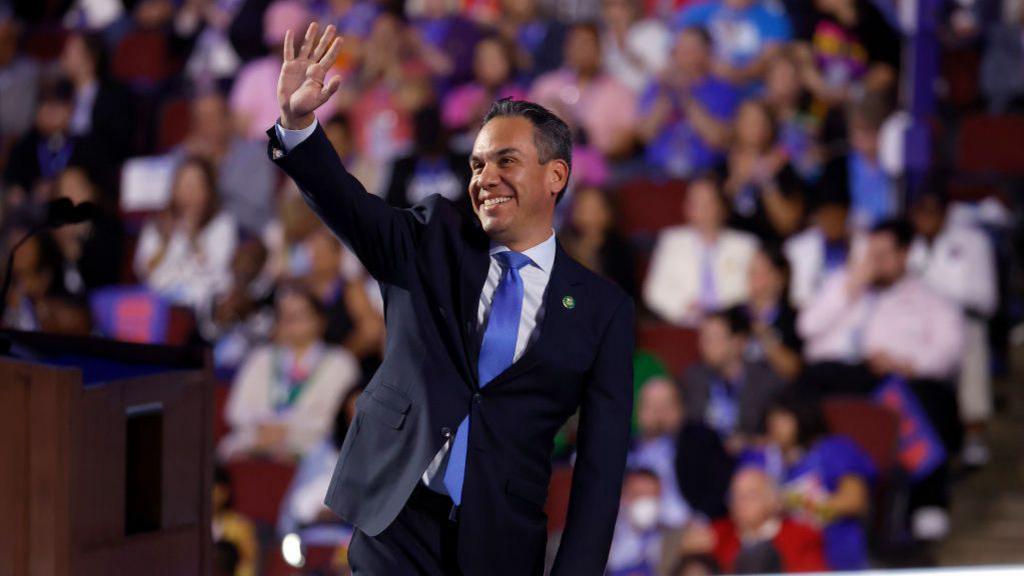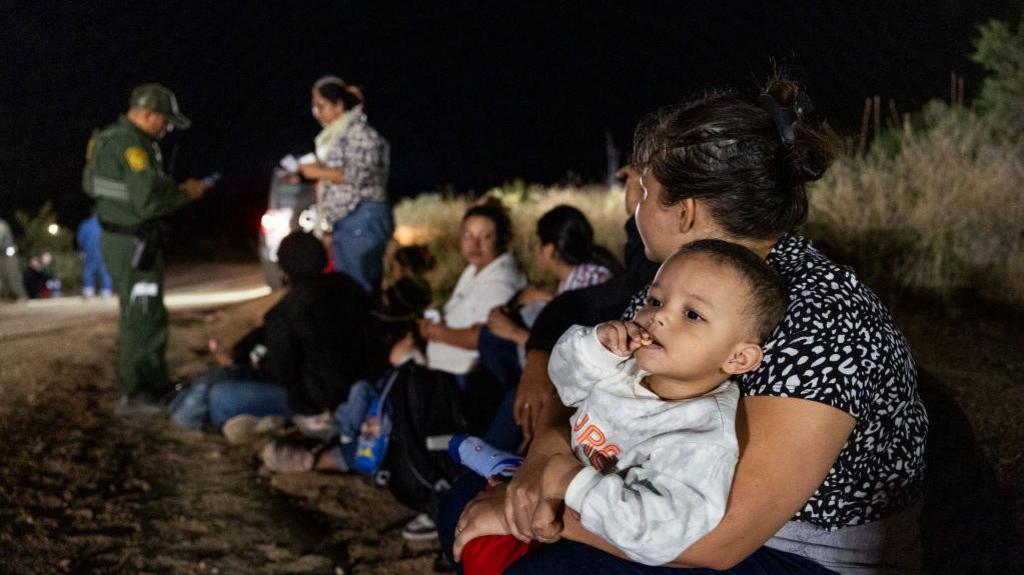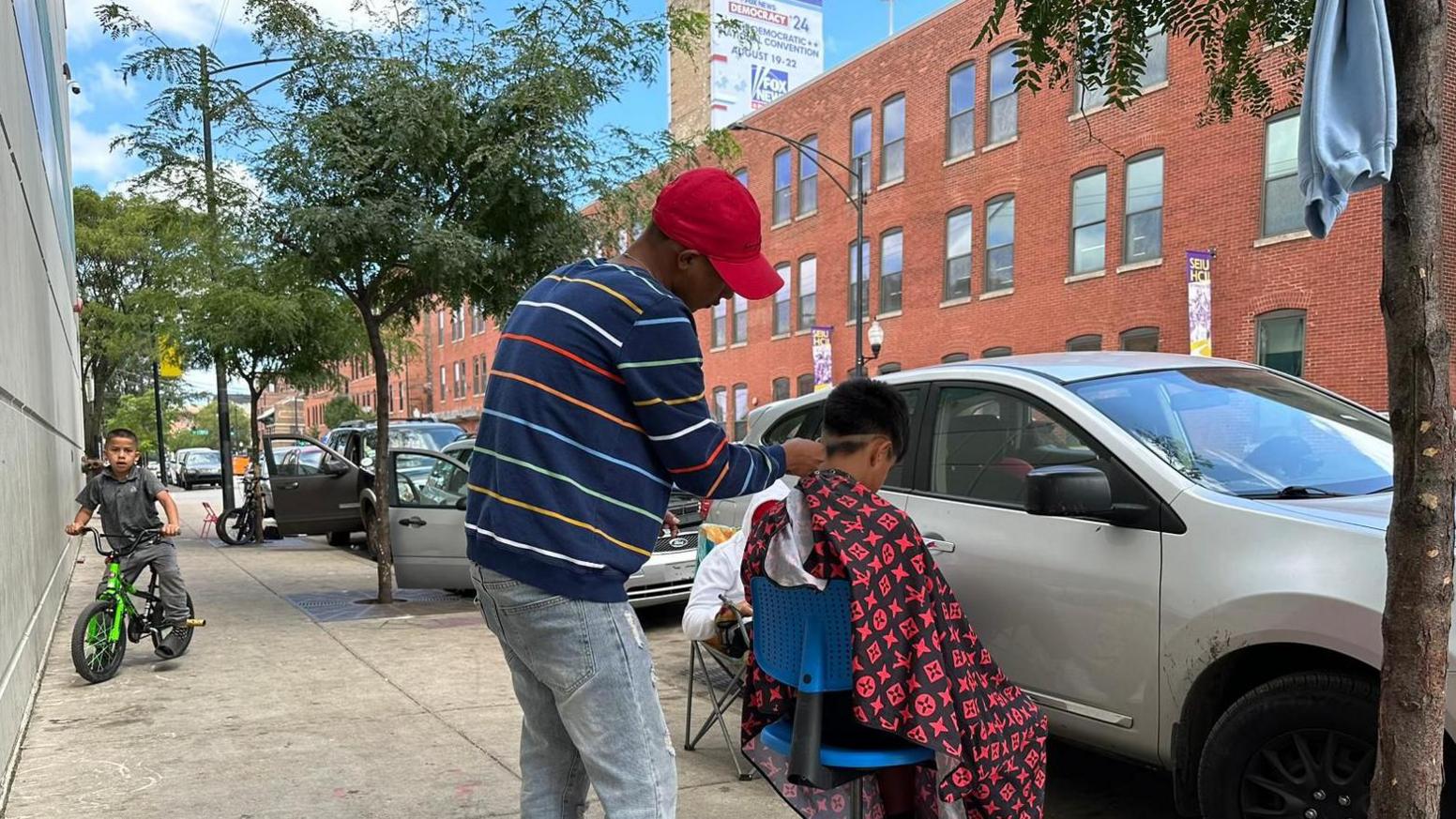Democrats try to turn tables on one of their biggest weaknesses

House Democratic Chair Pete Aguilar was among the lawmakers who defended Kamala Harris's handling of border issues at the DNC.
- Published
During a week designed to celebrate the party's successes, Democrats on Wednesday sought to confront one of their biggest political weaknesses.
Speakers at the Democratic National Convention tried to flip the script on Republican criticism of their immigration record, praising the Biden administration's efforts and calling Kamala Harris "tough as nails" on the issue.
Donald Trump and his Republican allies have made the border a focal point of their criticism Ms Harris, calling her a "failed border czar".
While record numbers of migrants were detained at the border during the Biden administration, the number of unlawful crossings has now fallen for five consecutive months.
Democrats have credited the decrease to recent actions by the administration to curb illegal immigration, including an executive order signed by President Joe Biden in June that allows US immigration officials to deport migrants without processing their asylum claims.
A recent poll from CBS, the BBC's US partner, found that 48% of likely voters believe crossings will go up if Ms Harris wins. A vast majority - 72% - said they believe they will decrease under Trump.
The issue came to the forefront of the DNC on Wednesday, with several speakers defending Ms Harris' record and slamming the former president for standing in the way of a bipartisan border security deal that collapsed in Congress earlier this year.
“Let’s be clear, the border is broken,” said New York Congressman Tom Suozzi, who has called for tougher border security and asylum laws.
In echoing a line frequently used by Republicans to attack Mr Biden's immigration policies, Mr Suozzi and other Democrats sought to show the party's shift toward a tougher immigration message on an issue considered to be one of their biggest political vulnerabilities.
Mr Suozzi added Ms Harris "joyfully accepts the challenge to work across party lines, to secure our border, to treat people like human beings".
The Trump campaign has targeted Ms Harris for her role in the administration's immigration policy, attacking her as a failed "border czar". As vice-president, one of Ms Harris's early diplomatic assignments was to address the economic conditions driving a surge of migrants from Central America to the US-Mexico border.
Connecticut Senator Chris Murphy, the lead Democratic negotiator who helped broker the measure that failed in Congress in February, said Ms Harris has been "tough as nails" on illegal immigration, pushing back on Republican accusations that she "opened the border" to unchecked migration.
"Kamala Harris knows we can be a nation of immigrants and immigration laws," he added. "That's why, when she's president, she will bring that border bill back, and she'll pass it."
The senator pointedly blamed Trump for the country's immigration problems.
"Trump killed that bill because he knew if we fixed the border, he'd lose his ability to divide us, his ability to fan the flames of fear about people who come from different places," Mr Murphy said.
Mr Murphy's comments were echoed by California Representative Pete Aguilar, the chairman of the House Democratic Caucus.
According to Mr Aguilar, voters need not "choose between a secure border and building an America for all".
"Under President Harris, we can and will do both," he added.
Later, Democrats played a video highlighting the stricter border policies outlined in the bill, which would have funded new border agents and technologies to combat fetanyl trafficking.

While record numbers of migrants have been detained at the border during the Biden administration, detentions fell for five consecutive months before the DNC.
On the floor of the DNC, some delegates suggested that immigration will be a secondary electoral issue for many voters more preoccupied with daily concerns - despite polling consistently showing it's a top concern for many.
"Immigration is certainly an important issue," said Julie Johnson, a Texas delegate, state representative and candidate for the House of Representatives in Washington.
"But other people's immigration does not affect whether they can go see a doctor, afford a home or whether they have a good paying job."
Others were more cautious.
Illinois Democratic Representative Jonathan Jackson - the son of famed civil rights activist Jesse Jackson - told the BBC that work remains to be done, and that he hoped Ms Harris would do more to immediately address the issue if she wins.
"We're going to have to deal with these migrant issues," said Mr Jackson, who argued that economically depressed communities of colour bear the brunt of any migrant influx. "People don't like to leave their dwellings without clothes or water or cash. But if the conditions are unbearable, they have to leave."
"I think she has to deal with (it on) day one," he added.

As politicians in the DNC spoke about immigration, migrants - mostly from Venezuela - milled about shelters just a few miles away.
Watch now on iPlayer (UK only)
Who Is Kamala Harris?
- Attribution
On the streets of Chicago - a blue city which saw tens of thousands of migrant arrivals over the last two years - many residents said they were sympathetic to the migrants, even if some were concerned they were a strain on local resources.
"They [the government] provided food, they provided housing, provided clothing," said Naaman Martin, an elderly Chicago resident who plans to vote for Harris. "But for the homeless, they claim they can't do nothing".
"It is what it is," he added. "It is not a voting issue for me."
Alexandra Willis, a 29-year-old store owner and Harris supporter, said she has a "lot of empathy" for migrants and wishes they had legal pathways to the country.
“They made it all the way here from another country," she said. "They’re very talented. I’d hire them but legally I can’t.”
Immigrants have expressed frustration that their difficult journeys to the US have become a political lightning rod.
As the DNC unfolded this week, several dozen, predominantly Venezuelan migrants gathered at a shelter just a few miles away, waiting for volunteers to distribute donated snacks as politicians nearby discussed policies that could eventually determine their fate.
While the migrants currently housed there are only vaguely aware of the ongoing convention, they are very familiar with immigration, the border and conceptions of "migrant crime" playing a prominent role in the US political debate.
Yelitza, a Venezuelan mother of four who fled her country after another son of hers was killed while participating in a protest march, said she feels that migrants are unfairly demonised by politicians, who don't understand the reasons that many left their countries to undertake an extremely perilous journey to the US.
"The trip was extremely hard. The jungle. Criminals in Mexico. Cartel members wanted to rape my niece. I did the trip with four little kids," she said.
"We're not here because we like it, or because I want to. Everyone needs to understand that," she added. "My country is in a disastrous situation. We only came here to give our children a future."